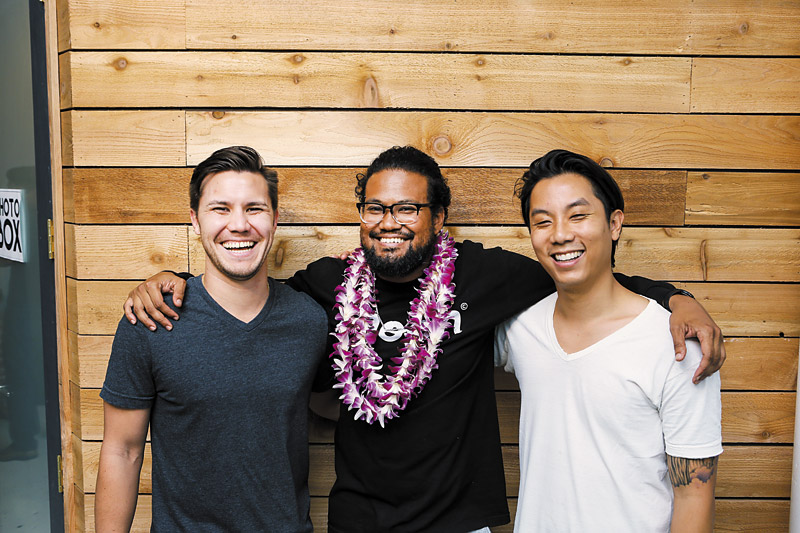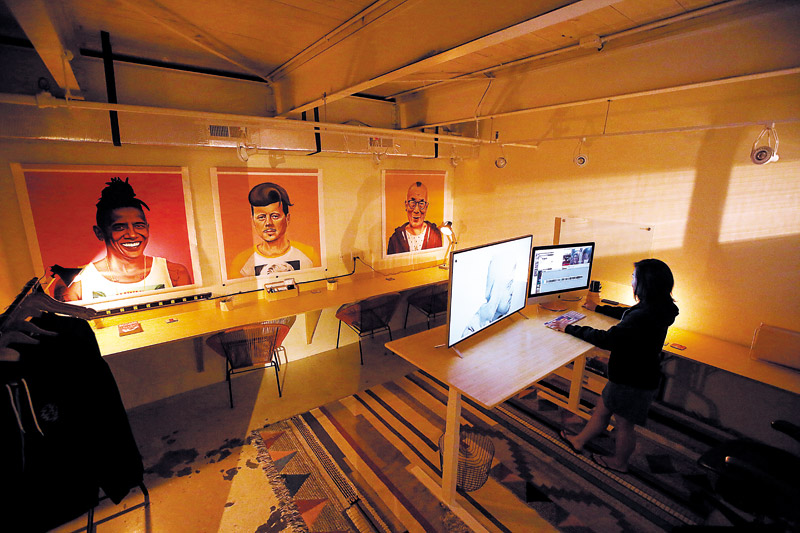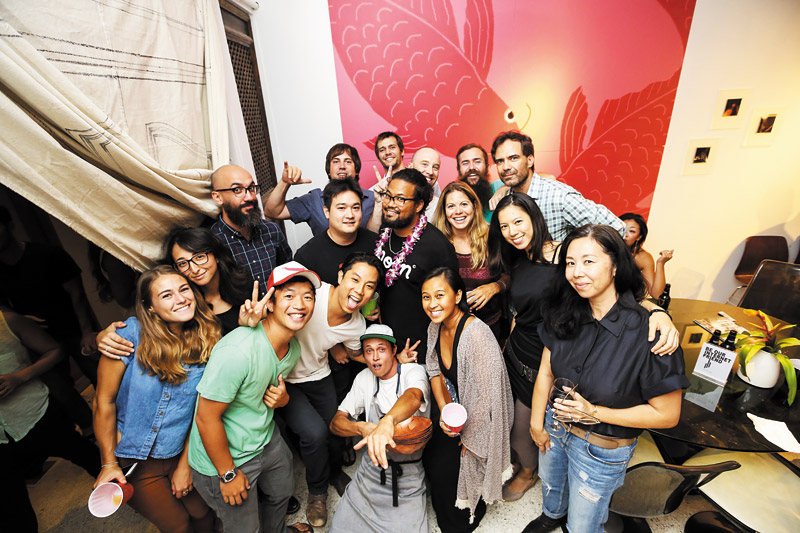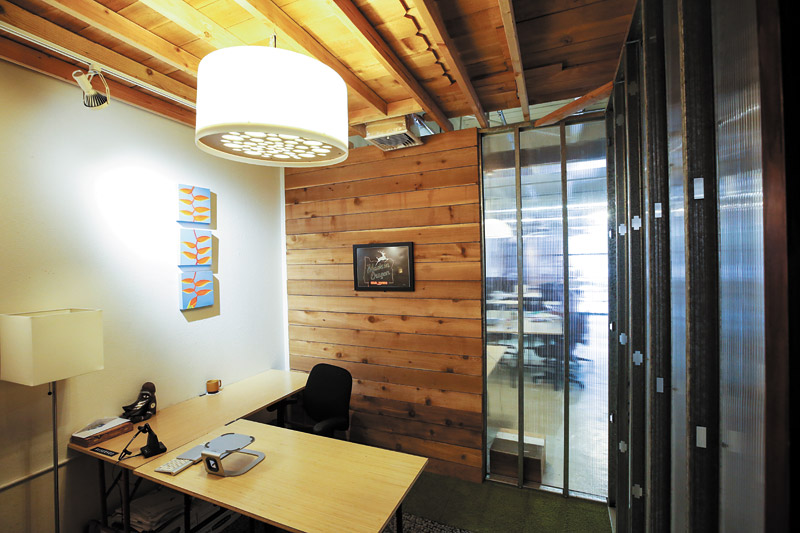The Bloom Of Box Jelly

Box Jelly founder Rechung Fujihira (center) with former Box Jelly manager Bryan Butteling (left) and current manager Daniel Pham
Before The Box Jelly co-founder Rechung Fujihira got on his current career trajectory — one that has entailed numerous accolades for his work, including being recognized as Young Entrepreneur of the Year by Hawaii Venture Capital Association in 2011 — he did, as he phrases it, “so many weird things.”
Fujihira, for a time, was a college dropout working odd jobs. But in founding Box Jelly alongside Anthony Stanford, it seems he hit his stride.
Box Jelly, which has the distinction of being the first co-working space in Hawaii, celebrated its fifth anniversary earlier this month. With the goal of supporting entrepreneurs and helping people make a living, Box Jelly is home to more than 40 members from a range of industries — tech, marketing, nonprofit and more.
“Our mission is to help Hawaii become the best place to live and the best place to work,” Fujihira says. “And we feel that where we can help out is supporting people who are doing their own thing.”
A few years ago, Fujihira had a stint where he spent his days walking door-to-door hauling a duffle bag filled with toys and random trinkets to sell — items that he recalls, “people really shouldn’t be buying.” It was just one of a string of jobs that Fujihira had had after dropping out of Kapiolani Community College to figure out what he wanted out of life — he’d also done construction, sold aloha shirts and worked in restaurants. For a while, he’d dreamed of becoming a DJ.
“It was a weird time — a lot of exploring, a lot of traveling,” he recalls.
Eventually, he decided to go back to school, enrolling at Chaminade University to study finance. Everything seemed set for him to enter the field — he was even scheduled for a financial internship while studying abroad in Shanghai. Then, a fateful error: He was placed in the wrong internship. He ended up instead at an arts center, spending his months in China engaged in the creative community.
“It was fun and it totally threw off my agenda,” he recalls.
When he returned home, he met up with Stanford — the two knew each other from an entrepreneurship program at Chaminade — who was still buzzing from his own recent travels.
But what had Stanford most excited wasn’t the traveling itself, but rather, the airport lounge. Stuck on a long layover, Stanford passed the time in an airport lounge and suddenly what had seemed like a terrible situation actually turned out to be wonderful: He found the lounge to be a productive place where he would get work done, and it was full of friendly people. Stanford (who has since left Box Jelly to pursue other projects) proposed that Fujihira work with him to recreate the experience — sort of an airport lounge … only without the airplanes.
Fujihira admits that he was initially skeptical (“I was like, ‘you have to sell me a little more than that!'”), but as they talked about it more, Fujihira realized the concept was about more than a lounge environment — it was about fostering a community and supporting local entrepreneurs, and subsequently nurturing the economy. So they went for it, setting up in the back of fishcake, a furniture shop in Kakaako that Fujihira’s mother owns. They simply hung up a sheet in the back of the store and Box Jelly was born.
Initially, they envisioned that it would be a pop-up work center — one that would take over underutilized spaces, like restaurants open only at night, and then disappear and re-appear somewhere different (coming and going periodically, like the box jellyfish). But, soon, a community began to form around the space, and they stayed put.
Over the course of the last five years, Box Jelly has been steadily expanding. When the shops adjoining fishcake closed after a couple years, Box Jelly moved in. And every time they had some extra cash, they added new features — a door here, a separate room there.
Scaling the business, Fujihira admits, was not always an easy task. There was a period a couple years after they opened that he and Stanford were working so much that they barely had time for anything else. One night, they were sitting in the conference room, their feet resting up on the table, and Fujihira noticed something: They both had holes in the bottom of their shoes.
They were so busy trying to grow Box Jelly that they didn’t have the time, or the money, to buy new shoes.
But they kept going. “We had a mission,” Fujihira says simply.
The dedication paid off. These days, the space is comprised of a main work area, separate tenant spaces, a private conference room and larger private event areas. It comes with all the amenities you could expect to find in any other office — storage space, reception service, a small kitchen.
In addition to supporting its own collection of entrepreneurs, Box Jelly also reaches out to the broader community by playing host to various related events. It’s served as the gathering space for Startup Weekend Honolulu, hosted tech meetups and conferences and even created its own startup courses.
Currently, Box Jelly is in the process of growing even more.
They’re aiming to open a second space in the downtown area within the next couple of months, and after that, Fujihira hopes they can expand to other parts of the island.
Box Jelly member Kelsey Barden, owner of new stand-up paddle board yoga company Yoga Floats, was joking with a friend recently about how hard it is to work from home. It was one of those funny-because-it’s-so-true jokes: The nap availability, they reasoned, is just too high.
Working from home, she says, “blurs the lines between home and work.”
“But when you walk into The Box Jelly, you know it’s work time,” Barden says. “For me, that distinction makes it easier to be productive.”
Providing that separation and cultivating an environment that is conducive to work are among the benefits of a coworking space that Box Jelly members list. But a key thing, members say, is the networking a space like this affords.
Throughout the day, web designers, writers, non-profit executives, architects and more go about their business. But as they go about their individual endeavors, there’s also room for networking and collaboration, which happens formally — Barden, for instance, hired an accountant through Box Jelly — as well as informally, with members going for drinks or playing basketball together after work.
“There are tons of people that have such interesting skills to offer that you can network with,” Barden says.
“It’s a great way to grow your business,” says Danny Ng, co-founder and marketing director of 50|50 agency, a branding and marketing firm that operates out of Box Jelly.
Ng explains that he and his business partners have made connections through Box Jelly that have turned into projects for their agency. Not only that, but they’ve also been able to seek advice from others in the space.
“Those things are invaluable,” he says.
While Fujihira’s mission of helping “Hawaii become the best place to live and the best place to work” already might sound like a big goal for a small space in Kakaako, Box Jelly signals something even larger — it represents, and supports, a change in the way we work.
There are some members of Box Jelly who are employed by companies based in other countries but work out of the space as telecommuters. Fujihira points out that even just 10-15 years ago, that may not have been possible.
“The culture of how people work is totally different,” he muses.
“The marketplace has become global, so that if you have a computer, you can market to people all over the place,” he continues. “People … are getting clients all over the world.”
Indeed, working remotely is a trend that has taken off in recent years and continues to expand. There are more than 50 million freelance workers in the country; an Intuit study estimates that there will be 60 million by 2020. And according to an industry forecast survey by Deskmag, an online magazine dedicated to co-working, the co-working movement is growing: 62 percent of co-working facility owners reported plans to expand within the year.
Fujihira feels that this dispersed way of working is here to stay.
“I think work in general — how work habits are and how the economy works — it’s just fundamentally shifted, and I don’t see it shifting back.”
That’s good news for Box Jelly, obviously, but Fujihira feels that sort of market shift is also good news for workers in general.
“There is this mobility — we can kind of choose what we want to do,” Fujihira says.
With that type of freedom, it means that when people opt into a place like Box Jelly, they’re really choosing it.
“People who come here … want to be here,” Fujihira says. “It creates this group of people who all want to be around each other … and I think that is the beauty of it.”
For more information, visit theboxjelly.com.





